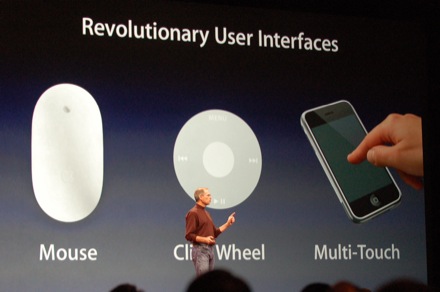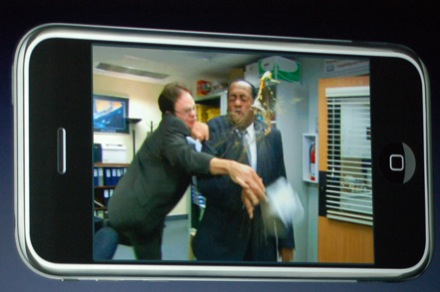von Roland Hachmann | Jan. 9, 2007 | Blog, Digital Culture, Mobile Marketing
Steve Jobs has announced the new iPhone. And man, do I want one!! You can check out a transcript of the presentation at engadget, including photos of the new toy. I borrowed some, hope that is alright (let me know when you need them back).
The main thing: the whole phone is a huge touchscreen, except for a homebutton. I mean everything. Even the button lock is unlocked via a move on the touchscreen (one that can’t just happen by accident in your pocket).
You apparently also don’t need a stylus, as you can do everything with your fingers, almost as you are used to it from the clickwheel from the iPod.
All the Buttons you need appear when you need them:
I am absolutely fascinated by this. Of course you can also listen to songs and watch videos with it. Freeking brilliant, really.
So what will it cost?
So how much more than $499 should we price it? We thought long and hard about it… it does so much stuff…†He’s stalling for the drama. Enough Steve! “What should we price it at? For a 4GB model we’re pricing it at $499 — no premium whatsoever.
“We’re going to have an 8GB model for just $599.â€
Unfortunately we’ll have to wait until June 2007 until it becomes available. And that’s probably only in the US. When will I be able to get it in Germany?
von Roland Hachmann | Jan. 3, 2007 | Ad News, Blog, Digital Culture, Digital Marketing, Marketing, Online Advertising, SEO / SEA
Chris Anderson, who wrote “The Long Tail†looks at the question concerning most of the small longtail bloggers: Can you make money in the Long Tail? This post is interesting in itself, as it looks at the different participants of the long tail: producers, aggregators and consumers – and how each one might benefit from the long tail.
But: He also quotes a Valleywag blogpost in which a website owner is cited to complain about Google:
I’m beginning to have my doubts about Chris Anderson’s long tail, the proposition that cultural boutiques can make a living on the Internet. One disgruntled publisher complains she’s owed less than the minimum Google can be bothered to pay her. And, as fast as she makes money, Google lifts the threshold. [She writes:] “When I started with Adsense in late 2004/ early 2005 the minimum was $25. Just when was about to hit the $25 minimum, they raised it to $50. Now that I have $45 in my account, the minimum is $100. Granted, I have a site with very low traffic, but how many website owners are getting screwed by Google? If the long-tail theory holds out, there could be millions of dollars of unpaid Google ads.â€
I can see where this website owner is coming from. I wonder, how much money Google earns with the money they centrally collect from advertisers (I assume, there is no threshold) and invest at, well, 5%-10% on any capital market. It will only be a few dollars each, but the sum of all the blogs probably results in big money.
I guess we have no way of imagining the amount of money one can make by deploying the long tail market. But someone at Google knew and implemented the threshold of payments. Very clever.
von Roland Hachmann | Dez. 24, 2006 | Blog
… I wish you a merry Christmas, I hope you all have relaxing holidays and a good, enjoyable run up to New Years Eve.
I myself will be spending this time with my family, looking forward to a few days of good company, good meals, good music and good times.
So I will get back to blogging sometime after the 29th, I suppose.
von Roland Hachmann | Dez. 23, 2006 | Ad News, Blog, Online Advertising
We have already seen quite a few ideas of the internet being adapted for Advertising.
Now the Dutch Grolsch Brewery has taken the „one red paperclip“ story of the guy who in essence traded a red paperclip for a real house by doing many clever trades along the way. In the Grolsch Story, a guy trades the new green Grolsch bottle for many things, all the way until he gets a Rolls Royce. But then… well, see for yourself:
https://www.youtube.com/watch?v=3jAv5rJM1UE
(hat tip)
von Roland Hachmann | Dez. 22, 2006 | Blog, Digital Culture, Marketing Trends
An editor of wired, Robert Lemos, has stopped watching regular TV and replaced everything with internet content.
Suddenly, our family was not sitting together in the living room watching television — except for the occasional DVD movie — but instead scattered around the house. My wife and I watched our shows on our office computers, and our kids watched theirs on a laptop in the kitchen. Within a few days, the diaspora driven by digital content already made the house seem, well, less homey.
Apparently, TV has never been the center of this family, but nevertheless, the fact that everyone all of a sudden watched „TV“ at their preferred PC-location changed everything.
Plus: watching live sports online is apparently impossible. This will be one of the only things left for programmed television: Sports, elections, ceremonies such as the Oscars or Royal Weddings. Things you have to watch live. Everything else can be customised, downloaded, and watched whenever you want.
The role of TV will have to change to keep up. And there will be some social implications when this media usage is shifting. No more common TV room. No more watercooler discussions about show xyz from the evening before (unless it’s one of the exceptions named above). TV will be in the same corner as any website or even a book. People will watch it a all different times and under different circumstances, TV programmers (and advertisers) will not know any more, in which personal context people will watch certain shows.
Robert Lemos concludes:
As for my family, we’ve decided to remain cut off from cable television, and live with the net as our entertainment lifeline. Before the Wired assignment came along, we were already headed toward paring our television consumption down to a few shows a week and the experiment showed that the internet could do that much.
In the end, getting videos from the internet is not the same as live television programming. However, in a few years, I believe it will be better.





 Wo ich sonst so bin...
Wo ich sonst so bin...